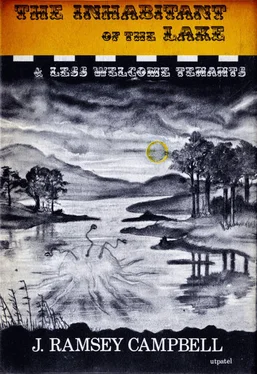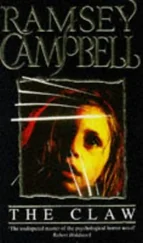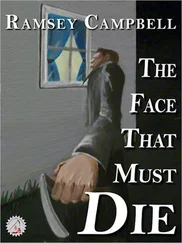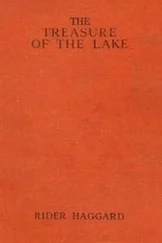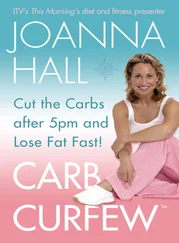'Oh, please don't try to be subtle,' Collier advised her. 'I know what you're after, and I can tell you now that I wouldn't dream of splashing my money about.'
'Why, you worm—' began Emily. Collier recoiled and collided with the sideboard, overturning a vase.
'My God,' Bond said tonelessly.
'What's wrong, Mr Bond?' asked Pamela.
'It doesn't matter now — nothing… I don't think you need me here any more tonight — I'd better be off… But could I just speak to you a minute, Mr Collier? Alone?'
Collier followed him into the hall, and the lawyer remarked:
'I'm afraid they don't feel very friendly towards you at the moment. I'm driving into the town centre, so if you'd like a lift somewhere to let them simmer down… Yes?' He called into the lounge: 'Mr Collier's leaving with me — he'll be back in a couple of hours.'
They drove away into the night. Collier dozed in the back seat but woke when the car began to slow down.
'But surely we're not in Brichester now! Haven't you come the wrong way?'
'Oh, no,' Bond said, stopping the car at the edge of a quarry. 'I assure you this is the right way.'
Two weeks later, Terence Brooke arrived at the lawyer's house in Almshouse Gardens, and found the owner at work in the greenhouse.
'Why, hello,' Bond greeted him. 'Any word about Collier yet?'
'No, none,' said Brooke. 'Nobody seems to know what to do about it.'
'Well, as I told the police at the time,' Bond went on, 'I took him to my office and told him how generally hated he'd be if he did you all out of your legacies, and he left, and that was the last I saw of him.'
'Somehow,' Brooke mused, 'I have the feeling he won't be back… But anyway, I didn't really come here about that-what-?'
'Bloody worms,' said Bond, driving his spade down again and again while something pale writhed. 'I can't stand the things… Oh, sorry. Go on.'
'I was going to say that my car's broken down just at the end of the road,' continued Brooke, looking away from the still descending spade, 'and I was wondering if you had a spanner I could borrow.'
'Well, I've got a heavy one in the back of the car,' began the lawyer, '…oh — oh, no, I'm afraid I lost it some time ago.'
'Never mind,' Brooke said, 'I'll have it towed to the nearest garage. But you ought to get yourself a new spanner, you know.'
'Oh, it doesn't really matter,' Bond assured him, wrenching his spade at last out of the ground. 'I never use it except in an emergency.'
Sitting in his office in Mercy Hill hospital, Dr James Linwood read the headline again:
PROMINENT BRICHESTER SURGEON TO ADVOCATE EUTHANASIA AT CONVENTION
… Prominent , eh? And on the front page too! But it was the Brichester Weekly News , of course, and anything local had automatic preference.
He glanced at his watch and saw that it showed five past midnight. Out of habit, he changed his desk calendar from April 2 to April 3, 1961. He leaned back in his desk and considered: should he go home to bed or stay to work on his convention speech? He decided on the latter, and switched on the tape-recorder.
At that moment there came a tap on the door — someone else working late, no doubt. He called out 'Good night,' but the shadow on the frosted glass panel did not move. Dr Linwood stood up and opened the door.
A man he had never seen before was standing outside. The doctor felt somehow instinctively repelled; whether by the man's dirty, ridiculously baggy trousers and long raincoat, or by a faint reptilian odour which he caught, he could not say. The other did not speak — and the silence began to unnerve Dr Linwood.
'Visiting time's over, I'm afraid,' he finally said.
'I'm not a visitor,' said the other in an abnormally deep and slow voice.
'Well, if you're a patient, you want the other side of the building.'
'No, I don't,' contradicted the visitor. 'I want to see you, Dr Linwood — you are the Dr Linwood? The one who's in favour of mercy killing?'
'That's correct,' confirmed the doctor, 'but at this time of night—'
'I want you to kill me,' the other said.
The doctor regarded him carefully, and decided he was not joking. 'I'm sorry — I advocate it, I don't carry it out — not yet, anyway. And I must say that you don't look like a euthanasia case.'
'But surely — if you thought somebody really needed it, you might… do it privately so nobody would know? I'd do it myself, but the thought of pain… I thought maybe an overdose of chloroform—'
'I'm sorry,' repeated the doctor more coldly, 'it's impossible at the moment, and anyway I do not intend it to make suicide legal.'
'But I need it,' insisted the man. 'I have a condition which makes living completely unbearable.'
'Maybe if I examined you—' suggested Dr Linwood.
The visitor shrank away from the doctor's hand. 'You mustn't see — it'd be too much… But perhaps I could convince you. If I can just tell you what's happened to me—'
'I don't really have the time—' protested the doctor, but the other had already pushed into the office and sat down before the desk. Well, perhaps he could use this in his speech to stress his aversion to legalised suicide. He sat down and motioned for the man to begin.
'My name is Roy Leakey,' began the other…
On April 1, 1961, Roy Leakey had set out for Exham. He had already visited all of Brichester's antiquarian bookshops; and, hearing that many fruitful second-hand shops existed in Exham, he decided to explore the town. Few people went there, and there was no direct railway line between the two towns, and no bus route whatever. He disliked train journeys, especially when changing trains was necessary, but here this seemed unavoidable. At the station he learned that only one train left for Exham that day, at 11:30; he would have to change at Goatswood at approximately 12:10 and wait perhaps twenty minutes for the connection.
The train left Lower Brichester station five minutes late and rushed to keep to schedule. Leakey jolted uncomfortably in his seat, staring uninterestedly out of the window. He found nothing interesting in the redbrick houses which rocked by below, advertisements painted in crude white letters on their railway-facing walls, nor even the gentle Cotswold hills which surrounded the line once it escaped the dismal cuttings. Soon the grass on the hills gave way to trees; close bare trunks which huddled closer until the entire landscape was wooded. He saw no houses among the trees, and sensed no life in the woods. Once he thought for a second that he saw a strange grey cone far off in the forest; then it was gone, but the sight filled him with an odd disquiet.
This far the line had been almost straight, except for the slight curves round the hills. Then, about half-an-hour out of Brichester, the train slowed to take a more pronounced bend in the track. Leakey's carriage reached the bend. The left-hand side, where he was sitting, was on the inside of the curve; and as he looked out, for the first time he saw Goatswood.
The impression he got from that first glimpse was of furtiveness. The close-set dull-red roofs, the narrow streets, the encircling forests — all seemed somehow furtive. Then his carriage passed the bend, and the train plunged down again through the bleak woods.
Five minutes later, Leakey watched the last carriage dwindle up the line, then looked about the platform.
Nobody else had alighted at Goatswood, and he could see why. The platform consisted of bare slippery boards, the waiting-room windows were dirty and inscribed with obscenities, the hard wooden seats were unpainted; the whole place seemed dead. Out of habit Leakey approached the stationmaster's office to ask when the connecting train would arrive. The man who appeared repelled him at once; he wore a grotesquely voluminous uniform, and his face was revoltingly goat-like — resembling some medieval woodcut of a satyr, Leakey thought.
Читать дальше
